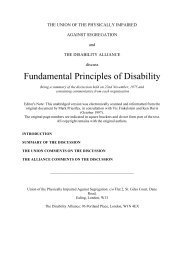Global-Report-Living-Colour-dr2-2
Global-Report-Living-Colour-dr2-2
Global-Report-Living-Colour-dr2-2
Create successful ePaper yourself
Turn your PDF publications into a flip-book with our unique Google optimized e-Paper software.
Inclusive Communities = Stronger Communities<br />
GLOBAL REPORT ON ARTICLE 19: THE RIGHT TO LIVE AND BE INCLUDED IN THE COMMUNITY<br />
139<br />
Table 12: Using the results of inclusion international’s research on the right to live<br />
and be included in the community. Steps to Inclusion<br />
1<br />
2<br />
3<br />
4<br />
5<br />
6<br />
7<br />
Research Finding<br />
People with intellectual disabilities<br />
don’t have the chance to decide<br />
where and with whom they live.<br />
People with intellectual disabilities<br />
have few choices about where they<br />
can live.<br />
Institutions deprive people of their<br />
rights.<br />
Most individuals with intellectual<br />
disabilities live at home with their<br />
families and receive little or no<br />
support.<br />
Families receive little or no support<br />
to help care for a person with an<br />
intellectual disabilities.<br />
Even when people with intellectual<br />
disabilities live in the community<br />
they are often isolated.<br />
Community systems – education,<br />
health, transportation, political<br />
processes, cultural and religious<br />
groups, employment, etc. – exclude<br />
people with intellectual disabilities.<br />
Strategies<br />
• Encourage and support children and<br />
adults who have an intellectual<br />
disabilities to speak for themselves and to<br />
express their hopes and dreams.<br />
• Focus on planning with individuals so<br />
they can create futures around their<br />
interests and desires.<br />
• Take advantage of services, programmes,<br />
jobs that are available in the community<br />
for all and provide support options there.<br />
• Don’t build new large centres to house<br />
people with intellectual disabilities.<br />
• Don’t invest in refurbishing existing large<br />
centres.<br />
• Start planning for the people now living<br />
in large centres so that they can become<br />
included in their communities.<br />
• Remove all incentives that give more<br />
support to children or adults if they move<br />
away from their families.<br />
• Provide supports to families AND to<br />
individuals with disabilities. Support<br />
organizations of families as well as selfadvocacy.<br />
• Conduct public awareness about people<br />
with intellectual disabilities to reduce<br />
stigma and prejudice.<br />
• Invest in making community<br />
programmemes and services accessible<br />
and inclusive rather than in programmes<br />
exclusively for people with disabilities.



